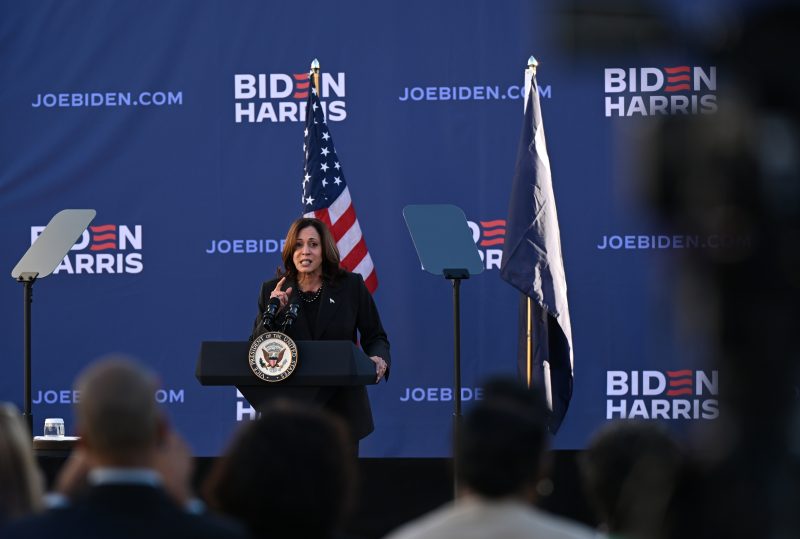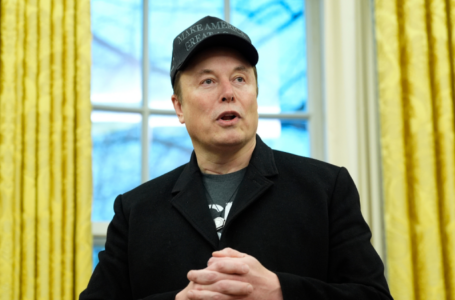US military shoots down Houthi drones as Trump’s strikes against terrorist group continue
Democrats seek to leverage Alabama embryo ruling in an election year


In the days since the Alabama state Supreme Court ruled that frozen embryos are people, Democrats have begun to seize on the decision, casting it as further evidence of a Republican-led assault on reproductive rights, an issue they have reason to believe already plays to their advantage.
The Alabama decision, which threatens the practice of in vitro fertilization, comes nearly two years after the U.S. Supreme Court overturned Roe v. Wade, prompting several states to enact restrictions on abortion and catapulting the issue of reproductive rights to the forefront of subsequent elections.
Democrats, including those in the White House, argue that the Alabama decision is a harbinger of further restrictions if Republicans make gains in Congress and expand their hold on statehouses nationwide. The Democrats hope the issue can boost turnout in an election year in which polling suggests a lack of enthusiasm for the incumbent president.
In its Friday ruling, the Alabama high court held that someone can be held liable for destroying frozen embryos, a common outcome in IVF procedures, which have been utilized in soaring numbers by families of all political stripes in the United States over the past decade.
L. Joy Williams, a Democratic consultant based in New York, said the ruling bolsters Democrats ahead of the 2024 election because it will widely be seen by families as part of “an escalating attack on their freedoms” by Republicans.
“What this says to families and individuals is we are going to continue to restrict your ability to make individual choices about your body and your livelihood,” Williams said. “And that motivates people to turn out.”
Reproductive rights have been a highly favorable election issue for Democrats in recent contests. Ever since the U.S. Supreme Court overturned Roe, every ballot measure that has sought to preserve or expand abortion access has been successful, while those that have sought to restrict abortion access have failed — even in states that skew conservative.
The White House was quick to put a spotlight on the Alabama decision. In a social media post Wednesday, Vice President Harris called it “outrageous” and said that it “is already robbing women of the freedom to decide when and how to build a family.”
And in a statement Thursday, Biden campaign manager Julie Chavez Rodriguez sought to pin blame directly on Donald Trump.
“What is happening in Alabama right now is only possible because Donald Trump’s Supreme Court justices overturned Roe v. Wade,” she said, alluding to the three justices nominated by Trump who currently sit on the court.
Biden cited the U.S. Supreme Court ruling in a statement later Thursday, vowing that he and Harris would fight “for the freedom of women, for families, and for doctors who care for these women.”
Some antiabortion groups praised the ruling — and called on other states to follow suit — but few Republicans on the ballot this year have rushed to embrace it.
Former U.N. ambassador Nikki Haley, the last major challenger to Donald Trump for the GOP presidential nomination, said she could see “where that’s coming from” when asked in a television interview Wednesday about the holding that embryos are people.
“I mean, embryos, to me, are babies,” Haley told NBC News. “One thing is to have to save sperm or to save eggs. But when you talk about an embryo, you are talking about — to me, that’s a life.”
But Haley did not address whether people should be held liable for destroying frozen embryos — and she spoke about “incredibly personal” conversations that should take place between doctors and patients undergoing IVF treatments.
“Let’s never underestimate the importance of the relationship between a doctor and patient when they’re doing any of that,” Haley said.
A spokeswoman for Haley did not respond to requests for elaboration on the candidate’s views.
A spokesman for Trump’s campaign also did not respond to a request for comment on the Alabama decision — a reflection of the broader silence on the issue from many Republicans. Numerous Republican campaign committees and candidates declined to comment on the Alabama case in recent days.
Meanwhile, some in the GOP sought to distance themselves from the ruling.
In a statement to The Washington Post, Rep. Michael Lawler (R-N.Y.), a freshman lawmaker who is running for reelection this year in a competitive district, said the Alabama ruling should be reversed.
“Millions of Americans struggle every year with infertility and rely on access to IVF treatments in order to become pregnant and enjoy the gift of parenthood,” he said. “The ruling in Alabama is extremely shortsighted and will have a negative impact on those seeking IVF treatment. It is simply unfathomable to me that a party that proclaims itself to be pro-family would support policies … like this one.”
According to the Centers for Disease Control and Prevention, 97,128 infants were born nationwide using assisted reproductive technology — the most common type of which is IVF — in 2021, the last year for which statistics where available. There are 453 IVF clinics nationwide, and every state except Wyoming has at least one clinic. The Pew Research Center reported that one-third of U.S. adults have used fertility treatments or know someone who has.
During a governors’ summit held by Politico on Thursday, several Republicans, including Georgia Gov. Brian Kemp, said they are unfamiliar with the details of the Alabama decision but that they remain supportive of IVF procedures.
Kemp said that while he hasn’t yet reviewed the Alabama ruling, he “wouldn’t even want to try to pretend to understand what the issue is there.”
New Hampshire Gov. Chris Sununu (R) directly attacked the ruling, calling it “scary” and arguing that Americans should be allowed access to IVF procedures. Sununu — who endorsed Haley in the GOP presidential primary — has long described himself as a “pro-choice” Republican.
In interviews, Democratic strategists argued that the Alabama decision is one the party should incorporate in its messaging ahead of a November election.
Democratic strategist Joe Caiazzo said it’s clear to him why Republicans have shied away from directly addressing the Alabama ruling. IVF, he said, is a popular procedure, and the decision “will only add to create an environment where large swaths of the population feel incredibly undervalued and unheard by the Republican Party.”
“This speaks to the enormous divide that you see in the country, between where the Republicans feel obligated to go versus where the public actually is on this matter,” Caiazzo said.
Nebeyatt Betre, a spokeswoman for the Democratic Congressional Campaign Committee, which helps recruit and support Democrats for House seats nationally, said “it’s clear voters are tired of Republicans’ dangerous and blatantly anti-woman agenda, and we’ll make sure to continue holding Republicans accountable for their disastrous impact on women’s rights.”
Betre noted that Dobbs v. Jackson Women’s Health Organization, the Supreme Court decision that ended Roe, stemmed from a Mississippi abortion restriction, “so we can’t feel any sort of security just because this is happening in Alabama.”
Illinois Gov. J.B. Pritzker (D), who earlier this month announced he would fund a push to get abortion measures on the ballot across the country, said the Alabama ruling proves “MAGA extremists” wouldn’t stop at restricting abortion access.
“They are coming for contraception. They are coming for IVF. They are coming for women. And they will lose when voters have their say,” Pritzker said in an email to The Post.
Democratic lawmakers also blasted the Alabama ruling.
Sen. Tina Smith (D-Minn.) called it “shameful,” and emphasized that reproductive freedom was “about more than just the right to have an abortion — it’s the right to make your own decisions about your reproductive health.” Rep. Mark Takano (D-Calif.) called the decision “extreme” and warned that it would scare doctors and practitioners from helping patients.
In the wake of the ruling, Sen. Tammy Duckworth (D-Ill.) — who conceived her two children through IVF and who has been a vocal proponent of reproductive rights — renewed a call for Congress to pass a bill she introduced that would establish a statutory right to access IVF and other assisted reproductive technology services nationwide.
Duckworth has been sounding the alarm on would-be threats to IVF for years, notably calling out Supreme Court Justice Amy Coney Barrett over her past support of a group that believes life begins at fertilization and that steps in IVF should be criminalized. Upon introducing her bill in January, Duckworth implored her Republican colleagues not to let “fringe subsets of their base” convince them to restrict procedures that people rely on to have children.
“In this scary, precarious, post-Dobbs world, we cannot risk one more state getting one inch closer to stripping one more person of the right to build their family, how they choose, when they choose,” Duckworth said then.
In the wake of the Alabama decision, the antiabortion organization Live Action signaled that the antiabortion movement should focus on replicating the ruling in other states. Founder Lila Rose said the court “rightly acknowledged the humanity of unborn children created through in vitro fertilization” and noted that the decision “is an important step towards applying equal protection for all.”
“The United States Supreme Court should take notice,” Rose said. “The Alabama Supreme Court decision should be applauded and used as a model of honest and prudential jurisprudence nationwide.”
Other antiabortion groups offered a more nuanced take on the ruling and sought to downplay its implications.
“The Alabama Court recognized what is obvious and a scientific fact — life begins at conception,” Katie Daniel, state policy director for SBA Pro-Life America, said in a statement. “That does not mean fertility treatment is prohibited. Rather it means fertility treatments need not carelessly or intentionally destroy the new life created.”
Maegan Vazquez and Patrick Svitek contributed to this report.











